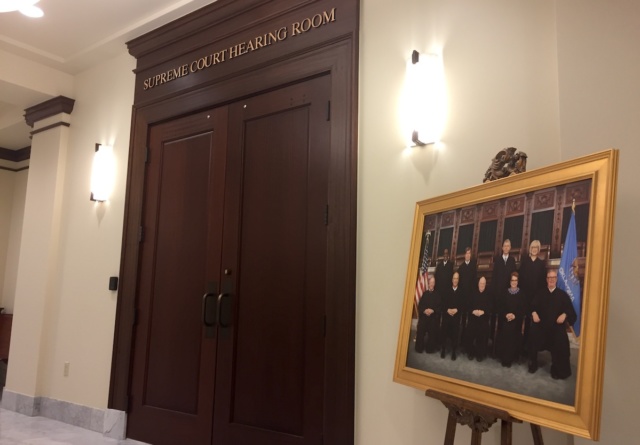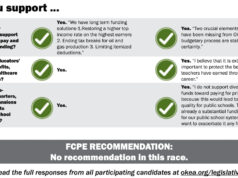

Amid all the hubbub surrounding several state questions and the various candidates who oppose or support them, you may be unaware that a minimum of seven justices and judges will appear on your Oklahoma ballot. They will be listed sans party affiliation, and none will have an opponent.
Instead, all voters are required to do is select whether to retain each appointee or not. Even this choice is made more simple by the fact that appointed judges at this level of government typically receive about 60 percent or more votes in favor of their retention, reaffirming the old adage, “If it ain’t broke, don’t fix it.”
In fact, every Oklahoma appellate judge and Supreme Court justice that has served his or her six-year term and faced a retention election has been approved, according to Oklahoma State Chamber senior vice president Jonathan Buxton, who has studied the topic. He noted that in other states — Iowa and Illinois, for example, — judges have failed retention votes.
Should the electorate revolt, it only takes a simple majority (50 percent) to remove a judge or justice from the bench.
So, now that you’re up to speed on just what the heck is going on with these prominent judges on the ballot, let’s take a closer look at who they are:
Oklahoma Supreme Court
Among this year’s class of retention incumbents, James Winchester has served the second-longest, having been appointed in January of 2000 by then-Gov. Frank Keating. The spouse of a former Republican state legislator, Winchester is considered one of the court’s most conservative members, as scored by KnowYourJudges.org, a site ultimately tied to the Oklahoma State Chamber.
In Winchester’s latest retention election, the Clinton native was approved with 65 percent of the vote. Similarly, Douglas Combs received 66 percent of the retention vote in 2012.
Combs, whom then-Gov. Brad Henry appointed in 2010, has been labeled one of the more liberal appointed judges in the state. Stuart Jolly, of the conservative group Americans for Prosperity-Oklahoma, called Combs “ultra-liberal” in 2012. Combs is a native of Shawnee.
Court of Criminal Appeals
Rob Hudson represents the newest appointment for the state’s last outpost of criminal justice, but he’s notable for helping establish Oklahoma’s first drug court. Appointed by Gov. Mary Fallin in 2015 following the retirement of Charles Johnson, Nov. 8 will mark Hudson’s first retention election for his seat.
Meanwhile, Carlene Smith represents the sole female appointee facing retention. Smith was appointed in 2010 and retained in 2012 with almost 66 percent of the vote, the second-highest approval of this year’s cohort. Smith was among the dissenters in a 3-2 decision to deny Richard Glossip a new hearing and fourth stay of execution in 2015, writing, “While finality of judgment is important, the State has no interest in executing an actually innocent man.”
Court of Civil Appeals
After being appointed in May 2006 by Henry, John Fischer has subsequently been retained twice, in 2008 and 2010.
Next, Larry Johnson represents the longest-serving appointee in this year’s election, having been selected for the seat in 1994 by then-Gov. (and NonDoc contributor) David Walters. Last, Fallin appointee P. Thomas Thornbrugh, with 67 percent votes in favor in 2012, exhibited the highest past retention vote of any incumbent.
Advocacy in performance reviews
Some groups currently attempt to proffer “ratings” of appellate judges, but such systems contain inherent biases because they’re based on partisan ideologies. For example, the Oklahoma Civil Justice Council, a product of the State Chamber of Oklahoma, explicitly states they approach judicial evaluations “from a particular substantive-policy point of view.” That point of view seeks to “protect Oklahoma business interests” and “file amicus briefs in appeals to the Oklahoma and U.S. Supreme Courts as a result of very damaging lawsuits.”
In effect, the group advocates against tort actions in an effort to protect business interests. To understand better the background of the tort-reform battleground, one can go all the way back to a 2002 article in The Nation:
Over the past decade, manufacturers, retailers and insurance companies have successfully ushered dozens of tort reform laws through state legislatures, but the courts in thirty-two states have held portions of those laws unconstitutional. Enraged corporate leaders have labeled the judges “activists,” rejected their judicial reasoning out of hand and threatened them with costly, knock-down, drag-out re-election campaigns.
Further, the OCJR commissions studies about judges with the help of a Washington, D.C.-based group called the Judicial Evaluation Institute (JEI), which apparently lacks a website. In fact, this vagueness extends back to 2005, when JEI executive director Neil Coughlan refused to disclose the source of funding for his group to the editorial board of the Lawrence Journal-World (although Coughlan did allude to the U.S. Chamber of Commerce as a “major source of funding.”)
Last, the JEI’s mission aligns closely with ALEC-sponsored legislation favoring tort reform, which Oklahoma passed this decade.
To be fair, even more neutrally sourced judicial evaluations have proven to be problematic. The National Center for State Courts created a Judicial Performance Evaluation Commission, but fewer than half of U.S. states conduct such sanctioned evaluations. For those that do, at least three studies have found biases in the evaluations against women and minorities.
Voting the ‘right’ way
The partisan persuasion outlined above with regard to state judges can become troubling when local media outlets blithely parrot “findings” without looking critically at the source of the information. Less than two weeks ago, The Edmond Sun reported the OCJR’s scores for all who currently seek retention and included a quote from State Chamber CEO Fred Morgan, who said, “The lower the score, the higher the cost is to you.”
Depends.
To really understand and analyze the suitability of a judicial appointee’s retention, you must divorce yourself from personal political leanings and avoid criticizing judges for issuing opinions that conflict with (or confirm) your own views.
Instead, take a tip from this recent Tulsa World editorial, and focus on whether a judge’s interpretation and application of the law could be considered fair.
To do that, you’ll probably want to look at this page, which features easily accessible links to recent decisions handed down by Oklahoma’s Supreme Court. For recent decisions from the Court of Criminal Appeals, you can research here, and for recent cases from the Court of Civil Appeals you can check here.
The TW editorial linked above, however, says just vote “Yes” for every judge. Apparently, they’re doin’ fine, Oklahoma.
(Editor’s note: The Oklahoma State Chamber is currently advertising on NonDoc.)




















